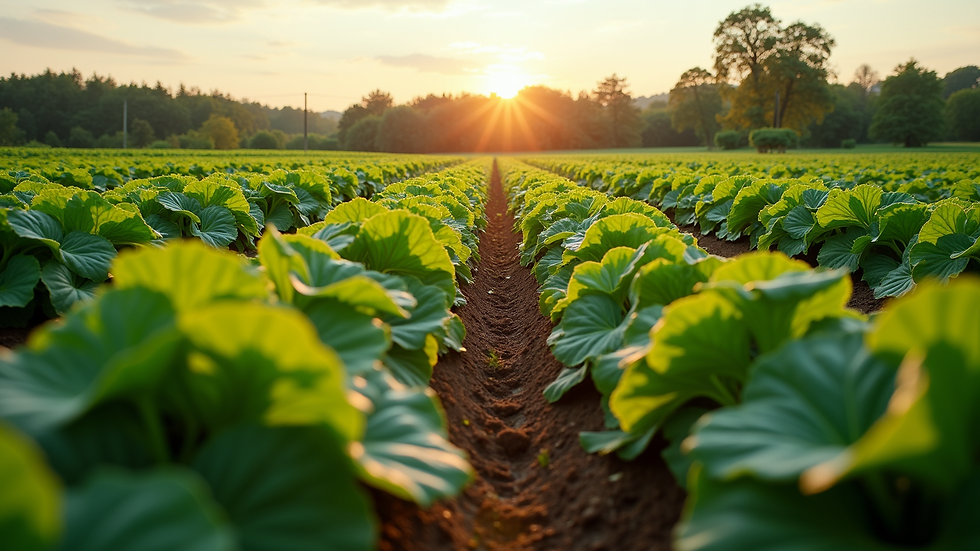How to Revolutionize Food Production for a Sustainable Future with Sustainable Agriculture Practices
- Protanica

- 5 days ago
- 3 min read
Feeding the growing global population while protecting the planet is one of the greatest challenges of our time. Traditional farming methods often strain natural resources, contribute to pollution, and degrade soil health. To meet future food demands responsibly, we must embrace innovative and eco-friendly approaches. This article explores how sustainable agriculture practices can revolutionize food production and pave the way for a healthier, more resilient food system.
Understanding Sustainable Agriculture Practices
Sustainable agriculture practices focus on producing food in ways that maintain environmental health, economic profitability, and social equity. These methods aim to minimize negative impacts on ecosystems while enhancing productivity and resilience.
Some key sustainable agriculture practices include:
Crop rotation and diversification: Alternating crops and planting a variety of species improves soil fertility and reduces pest outbreaks.
Conservation tillage: Reducing soil disturbance preserves soil structure and organic matter.
Integrated pest management (IPM): Combining biological, cultural, and chemical tools to control pests with minimal environmental harm.
Agroforestry: Integrating trees and shrubs into farming landscapes to improve biodiversity and carbon sequestration.
Efficient water management: Using drip irrigation and rainwater harvesting to conserve water resources.
By adopting these techniques, farmers can reduce reliance on synthetic fertilizers and pesticides, lower greenhouse gas emissions, and protect biodiversity.

Technologies Driving Sustainable Agriculture Practices
Modern technology plays a crucial role in advancing sustainable agriculture practices. Precision agriculture, for example, uses GPS, sensors, and data analytics to optimize inputs like water, fertilizers, and pesticides. This targeted approach reduces waste and environmental impact.
Other technological innovations include:
Soil health monitoring: Sensors and drones provide real-time data on soil moisture, nutrient levels, and microbial activity.
Vertical farming: Growing crops in stacked layers indoors reduces land use and water consumption.
Biotechnology: Developing pest-resistant and drought-tolerant crop varieties decreases the need for chemical inputs.
Renewable energy: Solar-powered irrigation and machinery lower carbon footprints on farms.
Farmers who integrate these technologies can increase yields sustainably while conserving resources.

The Role of Policy and Community Engagement
Government policies and community involvement are essential to scaling sustainable agriculture practices. Incentives such as subsidies for organic farming, grants for renewable energy adoption, and support for farmer education encourage wider adoption.
Community-supported agriculture (CSA) programs connect consumers directly with local farmers, fostering transparency and trust. These programs promote seasonal eating, reduce food miles, and support small-scale producers.
Educational initiatives that teach sustainable farming techniques empower farmers to implement best practices. Collaboration between researchers, policymakers, and farmers ensures that solutions are practical and effective.
Practical Steps for Farmers to Implement Sustainable Practices
Farmers interested in transitioning to sustainable agriculture can take several actionable steps:
Assess current practices: Identify areas where inputs can be reduced or replaced with eco-friendly alternatives.
Start small: Pilot new techniques on a portion of the land before scaling up.
Invest in soil health: Use cover crops, compost, and organic amendments to build fertile soil.
Adopt water-saving technologies: Install drip irrigation and collect rainwater.
Diversify crops: Plant multiple species to improve resilience and reduce pest pressure.
Engage with local networks: Join farmer cooperatives or sustainability groups for knowledge sharing.
These steps help farmers improve productivity while protecting natural resources.
Embracing Sustainable Food Production for a Better Tomorrow
Transitioning to sustainable food production is not just an environmental imperative but also a pathway to food security and economic stability. By combining traditional knowledge with modern innovations, we can create food systems that nourish people and the planet.
Consumers also play a role by supporting sustainably produced foods and advocating for policies that promote responsible agriculture. Together, these efforts can transform food production into a force for positive change.
Moving Forward with Sustainable Agriculture Practices
The future of food depends on our ability to innovate and adapt. Sustainable agriculture practices offer a roadmap to produce more with less harm. By investing in education, technology, and community collaboration, we can build resilient food systems that thrive for generations.
Embracing these practices today ensures a sustainable and abundant food supply tomorrow. The journey toward revolutionizing food production starts with informed choices and collective action.




Comments